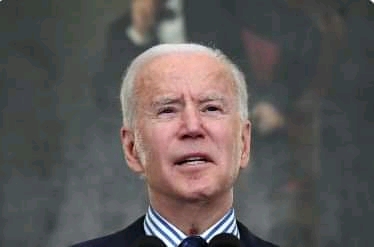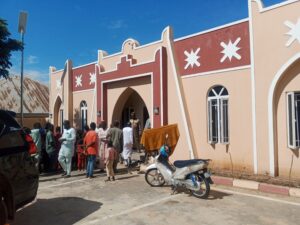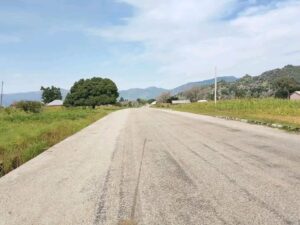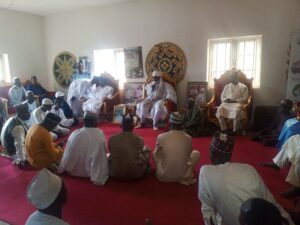
The United States President Joe Biden has invited President Muhammadu Buhari to a Leaders Summit on Climate holding between April 22 and 23.
Mr Biden also invited 39 other world leaders to the summit, which would be held virtually and be live streamed for public viewing across the globe.
A statement from the White House on Friday said Mr. Biden took the action on his first day in office to return the United States to the Paris Agreement, and days later, on January 27 announced that he would soon convene a leaders summit to galvanize efforts by the major economies to tackle the climate crisis.
The decision is intended to be actualized at the Leaders Summit on Climate convened by President Biden, which will underscore the urgency and the economic benefits of stronger climate action.
The Summit will be a key milestone on the road to the United Nations Climate Change Conference (COP26) holding in November in Glasgow.
The Statement by the White House said: “In recent years, scientists have underscored the need to limit planetary warming to 1.5 degrees Celsius in order to stave off the worst impacts of climate change. A key goal of both the Leaders Summit and COP26 will be to catalyze efforts that keep that 1.5-degree goal within reach.
The Summit will also highlight examples of how enhanced climate ambition will create good paying jobs, advance innovative technologies, and help vulnerable countries adapt to climate impacts.” It added that:
By the time of the Summit, the United States will announce an ambitious 2030 emissions target as its new Nationally Determined Contribution under the Paris Agreement.
In his invitation, the President urged leaders to use the Summit as an opportunity to outline how their countries also will contribute to stronger climate ambition.
It said the Summit will reconvene the U.S.-led Major Economies Forum on Energy and Climate, which brings together 17 countries responsible for approximately 80 percent of global emissions and global GDP.
The President also invited the heads of other countries that are demonstrating strong climate leadership, are especially vulnerable to climate impacts, or are charting innovative pathways to a net-zero economy. A small number of business and civil society leaders will also participate in the Summit.”
The statement revealed that key themes of the Summit will include: Galvanizing efforts by the world’s major economies to reduce emissions during this critical decade to keep a limit to warming of 1.5 degree Celsius within reach; Mobilizing public and private sector finance to drive the net-zero transition and to help vulnerable countries cope with climate impacts;
The economic benefits of climate action, with a strong emphasis on job creation, and the importance of ensuring all communities and workers benefit from the transition to a new clean energy economy.
Others are: Spurring transformational technologies that can help reduce emissions and adapt to climate change, while also creating enormous new economic opportunities and building the industries of the future; Showcasing subnational and non-state actors that are committed to green recovery and an equitable vision for limiting warming to 1.5 degree Celsius, and are working closely with national governments to advance ambition and resilience; and discussing opportunities to strengthen capacity to protect lives and livelihoods from the impacts of climate change, address the global security challenges posed by climate change and the impact on readiness, and address the role of nature-based solutions in achieving net zero by 2050 goals.
The invited 40 leaders, according to the statement, are: Prime Minister Gaston Browne, Antigua and Barbuda
President Alberto Fernandez, Argentina
Prime Minister Scott Morrison, Australia
Prime Minister Sheikh Hasina, Bangladesh
Prime Minister Lotay Tshering, Bhutan
President Jair Bolsonaro, Brazil
Prime Minister Justin Trudeau, Canada
President Sebastián Piñera, Chile
President Xi Jinping, People’s Republic of China
President Iván Duque Márquez, Colombia
President Félix Tshisekedi, Democratic Republic of the Congo
Prime Minister Mette Frederiksen, Denmark
President Ursula von der Leyen, European Commission
President Charles Michel, European Council
President Emmanuel Macron, France
President Ali Bongo Ondimba, Gabon
Chancellor Angela Merkel, Germany
Prime Minister Narendra Modi, India
President Joko Widodo, Indonesia
Prime Minister Benjamin Netanyahu, Israel .
Prime Minister Mario Draghi, Italy
Prime Minister Andrew Holness, Jamaica
Prime Minister Yoshihide Suga, Japan
President Uhuru Kenyatta, Kenya
President David Kabua, Republic of the Marshall Islands
President Andrés Manuel López Obrador, Mexico
Prime Minister Jacinda Ardern, New Zealand
President Muhammadu Buhari, Nigeria
Prime Minister Erna Solberg, Norway
President Andrzej Duda, Poland
President Moon Jae-in, Republic of Korea
President Vladimir Putin, The Russian Federation
King Salman bin Abdulaziz Al Saud, Kingdom of Saudi Arabia
Prime Minister Lee Hsien Loong, Singapore
President Matamela Cyril Ramaphosa, South Africa
Prime Minister Pedro Sánchez, Spain
President Recep Tayyip Erdoğan, Turkey
President Sheikh Khalifa bin Zayed Al Nahyan, United Arab Emirates
Prime Minister Boris Johnson, United Kingdom and
President Nguyễn Phú Trọng, Vietnam


